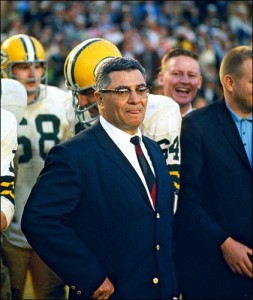by Chase Stuart
on May 21, 2013

Belichick checks to see where he is on the list.
Yesterday, I looked at the most pass-happy active head coaches and offensive coordinators in the NFL. If you’ve been a loyal reader of my previous posts on Game Scripts, you understand the methodology I’ve used today to grade each coaches. The quick summary is I’ve come up with the term “Game Scripts” to determine the average points margin over each of the 3600 seconds in each game; from there, I also came up with Game Scripts scores for each season. If you then take each coach’s pass/run ratio, adjust for the league average pass/run ratio, and then adjust for Game Scripts, then you can determine each coach’s passing identity. I’ve done this for every season since 1940.
The table below lists the 252 coaches I have in my database who have been either a head coach or an offensive coordinator for at least four seasons. I suggest using the search box to find your favorite coaches, but as always, all columns are sortable, too. In the table below, the number of HC/OC seasons includes all seasons, but the games, wins, losses, ties, winning percentage, and wins over .500 columns all include only the coach’s records as a head coach. The Game Script column shows each coach’s average Game Scripts average over each season, while the “P/R” column does the same for pass/run ratio. The next three columns are all indexes centered around 100. The “SCRIPT” column is the Game Scripts rating, the “PASS” column is the Pass/Run Ratio rating, and the Pass Identity column is a combination of the two columns. (You can read some of the other Game Scripts articles for more explanation). Based on his time in Green Bay with Aaron Rodgers, Joe Philbin comes in as the most pass-happy coach, but that number seems likely to decline the longer he coaches. George Seifert built his reputation as the defensive coordinator for the 49ers, but having Joe Montana, Steve Young, and Jerry Rice turned him into a pass-friendly coach. As for the next two men on the list, modern NFL fans need no further explanation.
[continue reading…]
Tagged as:
Bill Belichick,
Don Shula,
Game Scripts,
Paul Brown,
Vince Lombardi
{ }
by Chase Stuart
on February 4, 2013

The winner of the first Super Bowl.
Congratulations to
Ray Lewis,
Ed Reed,
Joe Flacco, and the Baltimore Ravens on winning Super Bowl XLVII. The Ravens and 49ers treated us to an exciting Super Bowl, and
the Hall of Fame chances of
Terrell Suggs,
Haloti Ngata,
Matt Birk,
Anquan Boldin, and yes,
Joe Flacco, are a lot better today than they were 24 hours ago. And while most writers today will focus on the champions, I’m going to go in a different direction.
Two years ago, the 49ers were 6-10 and floundering; they had the 5th worst record in the league from 2004 from 2010 in the pre-Jim Harbaugh era. Today, San Francisco possesses arguably the NFL’s most talented roster and best coaching staff, but is coming off a painful loss in the title game.
When I look at the 49ers, it’s hard not to see the striking similarities to an incredible turnaround executed 52 years ago. From 1953 to 1958, the Green Bay Packers were one of the league’s most poorly-run franchises. The team won just 20 games over that six-year period, the second fewest in the league. Vince Lombardi arrived in 1959, and the Packers won the NFL’s West Division in 1960, losing in the final seconds in the title game that year to Philadelphia. It was a heartbreaking loss, but the Packers used that game as motivation to win NFL titles in ’61, ’62, ’65, ’66, and ’67, with the latter two coming in the Super Bowl.
In 2011, I read and reviewed John Eisenberg’s excellent book That First Season: How Vince Lombardi Took the Worst Team in the NFL and Set It on the Path to Glory. Eisenberg looked at a subject that always fascinated me: the 1958 Packers, despite being the worst team in the league, had seven future Hall of Famers.
[continue reading…]
Tagged as:
49ers,
Jim Harbaugh,
Packers,
Vince Lombardi
{ }
by Chase Stuart
on June 26, 2012

Now just hold on. I never said you are what your record in close games says you are.
Which coaches have the best records in close games? That’s a complicated question that either means everything or nothing, depending on whom you ask. But putting aside what it means, what are the actual results?
I defined a close game as one where a team was trailing or leading by three points entering the 4th quarter since 1940.
The table below shows the coaching records in close games for all coaches who were head coaches in at least 20 close games. You can use the search box below to search for any individual coach. Note that coaches who coached prior to 1940 are included, but only their performances in games beginning in 1940 are listed below.
[continue reading…]
Tagged as:
Bill Belichick,
Bill Parcells,
Norv Turner,
Vince Lombardi
{ }



